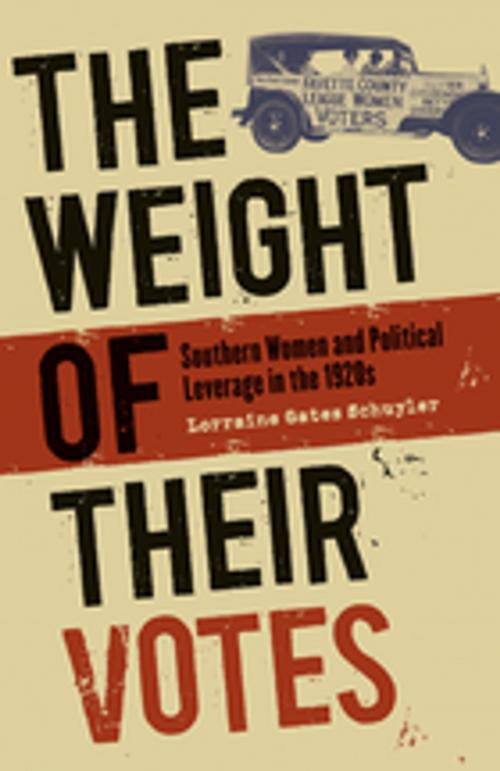The Weight of Their Votes
Southern Women and Political Leverage in the 1920s
Nonfiction, Social & Cultural Studies, Political Science, Politics, Practical Politics, Social Science, Gender Studies, Women&, History, Americas, United States| Author: | Lorraine Gates Schuyler | ISBN: | 9780807876695 |
| Publisher: | The University of North Carolina Press | Publication: | September 15, 2008 |
| Imprint: | The University of North Carolina Press | Language: | English |
| Author: | Lorraine Gates Schuyler |
| ISBN: | 9780807876695 |
| Publisher: | The University of North Carolina Press |
| Publication: | September 15, 2008 |
| Imprint: | The University of North Carolina Press |
| Language: | English |
After the ratification of the Nineteenth Amendment in 1920, hundreds of thousands of southern women went to the polls for the first time. In The Weight of Their Votes Lorraine Gates Schuyler examines the consequences this had in states across the South. She shows that from polling places to the halls of state legislatures, women altered the political landscape in ways both symbolic and substantive. Schuyler challenges popular scholarly opinion that women failed to wield their ballots effectively in the 1920s, arguing instead that in state and local politics, women made the most of their votes.
Schuyler explores get-out-the-vote campaigns staged by black and white women in the region and the response of white politicians to the sudden expansion of the electorate. Despite the cultural expectations of southern womanhood and the obstacles of poll taxes, literacy tests, and other suffrage restrictions, southern women took advantage of their voting power, Schuyler shows. Black women mobilized to challenge disfranchisement and seize their right to vote. White women lobbied state legislators for policy changes and threatened their representatives with political defeat if they failed to heed women's policy demands. Thus, even as southern Democrats remained in power, the social welfare policies and public spending priorities of southern states changed in the 1920s as a consequence of woman suffrage.
After the ratification of the Nineteenth Amendment in 1920, hundreds of thousands of southern women went to the polls for the first time. In The Weight of Their Votes Lorraine Gates Schuyler examines the consequences this had in states across the South. She shows that from polling places to the halls of state legislatures, women altered the political landscape in ways both symbolic and substantive. Schuyler challenges popular scholarly opinion that women failed to wield their ballots effectively in the 1920s, arguing instead that in state and local politics, women made the most of their votes.
Schuyler explores get-out-the-vote campaigns staged by black and white women in the region and the response of white politicians to the sudden expansion of the electorate. Despite the cultural expectations of southern womanhood and the obstacles of poll taxes, literacy tests, and other suffrage restrictions, southern women took advantage of their voting power, Schuyler shows. Black women mobilized to challenge disfranchisement and seize their right to vote. White women lobbied state legislators for policy changes and threatened their representatives with political defeat if they failed to heed women's policy demands. Thus, even as southern Democrats remained in power, the social welfare policies and public spending priorities of southern states changed in the 1920s as a consequence of woman suffrage.















